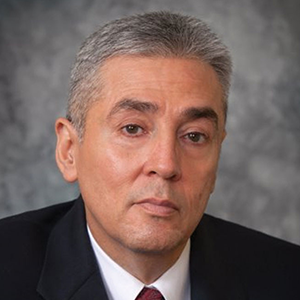Set your own expectations, says Andrés Gallegos (podcast)

Photo provided by Andrés Gallegos.
What do you know now that you wish you’d known at the start of your career? It’s a question that ABA Journal podcast host Stephanie Francis Ward loves to ask, one that can prompt incredible stories. It’s the question that inspired her to create a special series of her Asked and Answered podcast, titled Asked and Answered: Lived and Learned. In this episode, Ward speaks with Andrés Gallegos.
A veteran who graduated from law school after a 14-year career with the U.S. Air Force, Andrés Gallegos was married with a young family when an auto accident resulted in him having quadriplegia.
Then a third-year law firm associate, he took client phone calls during treatment at the Rehabilitation Institute of Chicago, even though some partners suggested that he leave private practice and become a government lawyer, because of false perceptions about the injury limiting his ability to practice law.
“When I became a double-hyphenated attorney, that is, a Hispanic-disabled attorney, I knew I had to work even more harder to show individuals, and myself, that I could do what I’ve always dreamed of doing, and that is being a lawyer,” says Gallegos, now a partner with Chicago’s Robbins, Salomon & Patt. Gallegos is a healthcare attorney whose practice includes disability law, and his clients include profit and nonprofit healthcare facilities.
In February, Gallegos was appointed to the National Council on Disability, an independent federal agency that makes policy recommendations about issues that affect people with disabilities. He also chairs the board of directors at Access Living Chicago, which centers on independent living for people with disabilities. That organization, and other independent living agencies across the country, are incredible resources to help people and their families who new to disability, Gallegos says, adding that many can use the expertise of lawyers on their boards and committees.
During the podcast Gallegos was asked about communicating in professional settings with someone who has a disability, and he had further thoughts after the discussion. Most importantly, he said, communicate and interact with people with disabilities “just like you would anyone else,” and never make assumptions about their abilities. After the interview, Gallegos wrote to share several more tips with the Asked and Answered: Lived and Learned audience.
“With respect to communicating and interacting with people with disabilities, my advice is to communicate with them just like you would anyone else,” he wrote. “However, it’s important to know that when speaking to someone who is deaf and who uses a sign language interpreter, you should speak directly to the deaf person as if the interpreter was not there, and do not direct your questions or comments to the interpreter. When speaking to someone who uses a wheelchair or scooter, while it’s often appreciated if you bend so you’re closer to the person’s eye level when talking to them, it’s not necessary. When interacting with people with disabilities, don’t make assumptions about their abilities or limitations, and always ask before volunteering to assist them, touching them, and if they use mobility devices, before touching their mobility devices.
“With respect to using the centers for independent living like Access Living of Metropolitan Chicago, those centers exist to help people with disabilities achieve maximum independence at work, school and housing and every part of their life. They are an incredible resource to persons and their families who are new to disability. I encourage everyone to support their local centers for independent living. Many of those centers can utilize the expertise of lawyers on their boards or on their committees, and they all can use lawyers’ financial support.
“Finally, disability can happen to anyone at any time, and often happens within fractions of a second. It is a natural part of the human experience.”
.png)
In This Podcast:

Andrés Gallegos
Andrés Gallegos is a shareholder with the law firm of Robbins, Salomon and Patt in Chicago, where he focuses his practice on disability rights and healthcare law.



